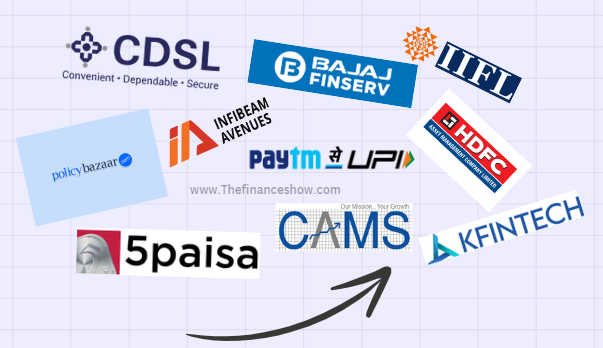Introduction
The fintech industry in India has rapidly evolved, leveraging technology to transform traditional financial services. With innovations in digital payments, lending, insurance, and wealth management, Indian fintech startups are at the forefront of this revolution. The sector’s growth trajectory is robust, driven by increasing internet penetration, smartphone adoption, and government initiatives like Digital India.

According to recent projections, the global fintech market is set to escalate from $294.74 billion 1 in 2023 to approximately $340.10 billion in 2024, with a compound annual growth rate (CAGR) of 16.5% anticipated through 20321. Concurrently, India’s fintech market is forecasted to achieve monumental growth, aiming to reach $1 trillion by 2030. This bullish outlook is supported by India’s rapid adoption of digital financial services and increased global interest in its fintech sector.
The Appeal of Indian Fintech Startups
Indian fintech startups have garnered significant attention and investment interest due to several compelling factors driving the hype around them. Firstly, these startups leverage cutting-edge technology such as artificial intelligence, blockchain, and machine learning to offer innovative financial solutions that are more accessible, efficient, and user-friendly compared to traditional financial services. For instance, digital payment platforms like Paytm have transformed everyday transactions, offering seamless payment options for millions of users and businesses across India.
Moreover, Indian fintech startups cater to a burgeoning market of tech-savvy consumers who increasingly prefer digital and mobile-first financial solutions. With India’s rapidly increasing smartphone penetration and internet connectivity, fintech startups have capitalized on this trend to reach a vast and diverse customer base, including in rural and underserved areas.
Compared to traditional financial services, fintech startups often offer lower costs, faster processing times, and enhanced transparency, making them more appealing to both consumers and businesses. These startups are agile and adaptable, able to quickly innovate and respond to changing market demands and consumer preferences.
You May Like: Are Indian Renewable Energy Stocks the Next Jackpot For Investors?
Leading Fintech Stocks in India
As we approach 2024, several fintech stocks in India have emerged as frontrunners, poised for substantial growth and market dominance. Here’s a closer look at some of the best fintech stocks in India:
1. One 97 Communications Ltd (Paytm)
Founded in 2000, Paytm is India’s leading digital ecosystem, serving over 333 million users and 21 million merchants as of March 2021. The company dominates the digital payment sector with offerings like wallets, Paytm Postpaid, and QR codes, processing a staggering GMV of ₹8.5 lakh crore in FY22.
It holds a significant 13% share in UPI payments and 50% in peer-to-merchant transactions. Paytm’s revenue mix primarily derives from payments and financial services (80%) and commerce and cloud services (20%). Despite regulatory challenges and increased marketing expenses, Paytm continues to expand its market presence through strategic partnerships and innovation, including the introduction of India’s first Paytm Card Soundbox for enhanced payment experiences.
2. 5Paisa Capital Ltd
5paisa Capital Ltd, established in 2007, is a prominent fintech company in India, specializing in online discount stock broking, depository services, and financial product distribution. As of Q2FY24, it ranks as the 5th largest discount broker in India with a substantial client base of over 3.73 million customers and 16.5 million app users, predominantly from Tier II & III cities. The company’s revenue mix includes brokerage and commission fees, allied broking income, and cross sales.
Known for its technological prowess, 5paisa offers multi-lingual services, digital onboarding, and personalized advisory through a user-friendly platform. Recent initiatives like FnO 360 and expansion into wealth management highlight its commitment to innovation and customer-centric services.
3. Bajaj Finance Ltd
Bajaj Finance Ltd. is one of India’s largest and most diversified NBFCs, tracing its roots back to 1987. With a robust presence across urban and rural India, it offers a wide array of financial products. The company dominates in consumer lending, serving as a major financier for electronics and digital products.
It also excels in mortgages, SME lending, rural financing, and commercial loans, showcasing significant growth in these segments. Bajaj Finance boasts a strong financial position with an AUM of Rs. 310,968 crore as of 9MFY24, reflecting a 35% increase year-on-year. With low NPAs and strategic expansions through acquisitions and QIPs, Bajaj Finance remains a stable choice for investors seeking exposure in India’s financial sector.
4. HDFC Asset Management Company Ltd
HDFC Asset Management Company Ltd, established in 1999, manages HDFC Mutual Fund, boasting a substantial AUM of approximately ₹4.48 lakh crore as of 9MFY23. With a robust market presence, it commands a 11.7% share in actively managed equity funds and 13.5% in debt funds.
The company operates through a vast network of over 75,000 distributors and 228 investor service centers across 200 cities. Offering diverse product categories including equity, debt, hybrid, and ETFs, HDFC AMC is renowned for its strong investment management capabilities, evidenced by its revenue composition primarily from investment management fees (~86%).
5. Central Depository Services (India) Ltd
Central Depository Services Limited (CDSL) is integral to India’s capital market infrastructure, facilitating seamless securities transactions in electronic form. It supports dematerialization, rematerialization, and secure holding of various securities such as equities, bonds, mutual funds, and more.
Key services include e-Voting and the Myeasi Mobile App, enhancing investor convenience. CDSL’s revenue streams are diversified, with substantial contributions from issuer income, transaction charges, and IPO/corporate action income. With a robust network of over 580 registered Depository Participants (DPs) across India, CDSL continues to expand its market presence and technological capabilities, including investments in initiatives like ONDC to bolster India’s digital commerce ecosystem.
6. IIFL Finance Ltd
IIFL Finance Ltd is a diversified NBFC in India, specializing in retail loans such as Home, Gold, Business, and Microfinance loans. With a robust branch network of ~2,700 branches across tier-1 and tier-2 cities, it maintains a strong market presence, particularly in South and West India.
The company’s focus on retail loans comprises 93% of its loan book, emphasizing its shift towards consumer lending. Supported by a solid Capital Adequacy Ratio of 25.6% and low Net NPA of 1%, IIFL Finance Ltd demonstrates strong financial health. Its digital initiatives and partnerships with fintech firms underscore its commitment to innovation and customer-centric services, enhancing its competitive edge in the fintech sector.
7. Computer Age Management Services Ltd (CAMS)
CAMS (Computer Age Management Services Ltd) is India’s largest registrar and transfer agent of mutual funds, commanding a market share of approximately 69%. It offers comprehensive investor services, distributor services, and asset management company (AMC) services, making it a pivotal player in the financial services ecosystem.
CAMS is renowned for its innovative offerings such as the CAMS KRA, providing industry-first AI-powered KYC solutions with 18 million KYC records. Its CAMS Pay product dominates the mutual funds ecosystem with over 2 lakh UPI autopay mandate registrations and significant monthly transaction volumes.
With a diverse revenue model primarily based on AUM fees, CAMS maintains strong client relationships and a broad geographical presence across India, supported by a robust network of service centers.
8. KFin Technologies Ltd
KFin Technologies Limited is a leading fintech company offering comprehensive financial services across India and international markets. Specializing in investor and issuer solutions, KFin serves a wide array of clients including mutual funds, pension funds, and corporate issuers.
With a dominant market share in equity mutual fund AAUM and a robust presence servicing 25 out of 46 AMCs in India, KFin manages over 131 million investor folios and processes 1.6 million transactions daily. The company’s diverse revenue streams include domestic mutual fund services, international investor solutions, and global business services.
Despite regulatory challenges, KFin continues to expand its service offerings and geographic footprint, enhancing its position as a key player in the financial services sector.
9. PB Fintech Ltd (Policybazaar)
PB Fintech Ltd, operating through Policybazaar and Paisabazaar, dominates India’s digital insurance and lending sectors. Policybazaar, established in 2008, commands a 93.4% market share in digital insurance sales, facilitating transactions for over 19 million policies. Paisabazaar, launched in 2014, holds a 51.4% market share in digital consumer credit, with disbursals totaling Rs. 2916 crore in FY21.
The company leverages AI, ML, and data science for robust marketing, KYC, and risk assessment, enhancing customer acquisition and retention. With an asset-light model, PB Fintech partners with 51 insurers and 54 financial institutions. Its recent IPO, oversubscribed by 16.59 times, raised Rs. 5625 crore for brand visibility, expansion, and strategic investments, highlighting strong investor confidence.
10. Infibeam Avenues Ltd
Infibeam Avenues Ltd, established in 2017, is a prominent fintech company offering comprehensive digital payment solutions and enterprise software platforms. IAL operates CCAvenue, a payment gateway providing over 250 payment options and processing in 27 international currencies. Its services span digital payments, e-commerce, and specialized platforms like Government e-Marketplace (GeM) and Bharat Bill Payment Services (BillAvenue).
IAL’s diversified business model includes a Merchant Centric Model aiding digital transactions and a Bank Centric Model focusing on robust payment infrastructure. The company serves over 1 million merchants and is the third-largest payments solutions provider in India by revenue.
Recent expansions include forays into offline payments in the UAE and significant investments in AI-driven fraud detection. With strong financials, a robust client base, and strategic international expansions, IAL presents a compelling investment opportunity in the fintech sector.
Why Invest in Fintech Stocks?
Investing in fintech stocks presents a compelling opportunity due to the industry’s rapid growth, disruptive potential, and ability to cater to evolving consumer preferences. Fintech companies are at the forefront of digital transformation in financial services, offering innovative solutions that resonate with tech-savvy consumers.
Factors to Consider Before Investing in Fintech Stocks
Before investing in fintech stocks, it’s essential to consider the following:
- Regulations: Understand the regulatory landscape and potential changes that could impact fintech companies.
- Trends and Growth: Analyze the growth trends in digital payments, insurtech, and wealth management.
- Financial Health: Evaluate the financial performance of fintech companies, including revenue growth and profitability.
- Technology Adoption: Assess the companies’ technological capabilities and innovation potential.
- User Base and Security: Ensure the companies have a large user base and robust security measures.
- Leadership and Partnerships: Examine the management team and strategic partnerships, which can significantly influence a company’s success.
Risks Associated with Investing in Fintech Stocks
Investing in fintech stocks carries inherent risks, including:
- Regulatory Changes: New regulations could adversely affect fintech companies’ operations and profitability.
- Intense Competition: The fintech sector is highly competitive, making it challenging for companies to stand out.
- Cybersecurity Threats: Fintech companies must safeguard against cyber-attacks, which can severely impact their reputation and operations.
- Technological Obsolescence: Rapid technological advancements may render existing technologies obsolete.
- Customer Acquisition and Retention: Attracting and retaining customers is crucial, especially when competing against established banks.
- Operational Challenges: As fintech companies grow, they may face challenges in managing expanding operations and customer bases.
- Market Fluctuations: Fintech stocks can be affected by market fluctuations and economic factors.
Conclusion
The rapid rise of India’s fintech industry offers a compelling opportunity for investors. With innovative companies reshaping the financial services landscape, fintech stocks present the potential for significant returns. However, investors should carefully consider the regulatory environment, technological adoption, and financial health of these companies before investing.
In the exponentially growing fintech sector, key players like Razorpay, PhonePe, PayU, and MobiKwik, though not publicly listed yet, are worth watching for potential future IPOs. Established firms like Paytm, 5Paisa Capital, Bajaj Finance, HDFC Asset Management, CDSL, IIFL Finance, CAMS, KFin Technologies, PB Fintech, and Infibeam Avenues present strong investment opportunities. By staying informed and making prudent choices, investors can leverage the dynamic fintech landscape in India for substantial gains.
Investing in fintech stocks offers exciting opportunities, but it’s crucial to stay updated on market trends, regulatory changes, and technological advancements to make informed decisions and maximize returns.
Disclaimer: This blog is intended solely for educational purposes. The mentioned securities and investments are not recommendations.










